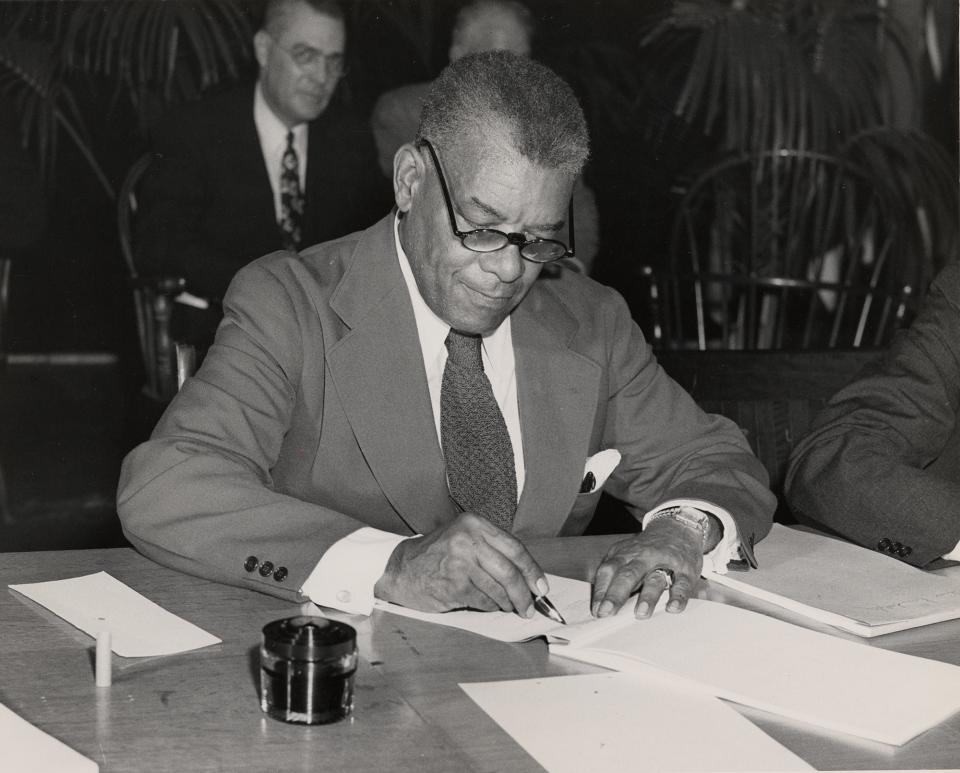Who was Oliver Randolph, New Jersey's civil rights pioneer? | Stile
Upending the nation's segregated social systems did not appear to be Oliver Randolph's primary aim when he set up a law practice in Newark in 1914 after graduating from Howard University Law School.
A scion of a prominent Mississippi family — his father served two terms in that state's Legislature during the Reconstruction period in the 1870s — Randolph, who went on to become the only Black delegate to the 1947 New Jersey Constitutional Convention, sought to effect change by working within the system.
He quickly drew the notice of the Essex County Republicans, and in 1922, Randolph became the second African American in New Jersey history elected to the state Assembly. He used his perch to author the state’s anti-lynching law — but held the post for just one term.

Randolph also leveraged his growing status in the Republican Party, still viewed favorably and loyally by Blacks as the party of Abraham Lincoln, the emancipator of slaves. Randolph retained his loyalty even as Franklin Delano Roosevelt's New Deal progressivism began attracting Black voters to the Democratic Party in the 1930s.
Randolph could never sanction supporting Democrats, dominated at the time by the oppressive segregationists of the South. Throughout much of his career, he could be counted on to deliver a lacerating critique of Democratic candidates for Congress, often accusing them of being enablers of the Southern Democrats who used their clout on Capitol Hill to block civil rights protections.
Stile: Against all odds, this Black NJ lawyer helped ignite the civil rights movement
In 1924, he turned his criticism to Republican U.S. Senate candidate Hamilton F. Kean. Randolph targeted Kean, whose grandson, Thomas, became New Jersey governor in the 1980s, for courting the support of the Ku Klux Klan. Former Gov. Walter E. Edge would go onto win easily. Randolph would later support Kean’s second and successful attempt in 1928.
In the 1937 governor's race, Randolph leveled attacks at Sen. A. Harry Moore, a Democrat, for supporting Supreme Court nominee Hugo Black, who had once been a Klan member in Alabama.
"Here is a man now, sitting in judgment of other people, who admits that he belonged to that organization which is opposed to Jews, Catholics and Negroes,'' Randolph said at an NAACP meeting in Newark. He said Moore was "not representing the people of this state'' when he cast his vote in favor of Black. (Moore went on to win a third term as governor that year.)
And during an intraparty primary skirmish in 1925, Randolph wasn’t shy about confronting a Republican candidate for governor — who was aligned with an opposing faction — at a raucous candidates event at a Newark meeting hall.
He demonstrated the willingness to confront public figures, a tactic that came in handy two decades later when he was a convention delegate at Rutgers.
New Jersey: Commitment ceremony held to draw attention to the rights of the disabled
“Why don’t you denounce the Klan if you want colored people to vote for you?” Randolph pointedly asked state Sen. Arthur Whitney, a candidate for governor.
Whitney's replies were soon “lost in a hubbub of cheering, handclapping and hisses,” according to a newspaper account.
Randolph became allied with some of New Jersey's most prominent Republicans of the first half of the 20th century, first with Edge, the legendary U.S. senator and former governor, in the 1920s. Two decades later as the constitutional convention took shape, Arthur T. Vanderbilt, the influential government reformer and powerful Essex County attorney, included Randolph among the 11-person Essex County delegation, according to a Rutgers University Law School article that examined the origins of Randolph's famous anti-segregation provision to the 1947 Constitution.
And eventually, then-Gov. Alfred E. Driscoll, who in many ways brokered the convention into existence, personally intervened to ensure Randolph landed a spot on the Committee on Rights and Privileges, which would draft the language for fundamental rights.
It was a major step for Randolph, who had become a pillar of the Black community and who escorted Olympic track hero Jesse Owens in a triumphant tour of the New York metropolitan area just months after his historic, gold medal performance in the 1936 Games in Berlin. Randolph got the job of accompanying Owens as the director of publicity for the "Colored Division" of the Republican national campaign.
At the time of the constitutional convention in 1947, Randolph was 64. According to Bernard K. Freamon, a former Seton Hall law professor who wrote in a 2004 Rutgers Law Journal article about Randolph's efforts to introduce language that barred discrimination, Randolph was heavyset and moved through the convention's proceedings with with a “slow, deliberative smile and a booming baritone."
“He was undoubtedly well aware of the implications of his election to the convention and he likely made sure to seize the opportunity to put his mark on the document that the convention would ultimately produce," Freamon wrote.
Charlie Stile is a veteran New Jersey political columnist. For unlimited access to his unique insights into New Jersey’s political power structure and his powerful watchdog work, please subscribe or activate your digital account today.
Email: stile@northjersey.com
Twitter: @politicalstile
This article originally appeared on NorthJersey.com: Who was Oliver Randolph, New Jersey's civil rights pioneer?

